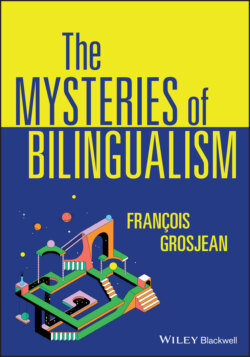Читать книгу The Mysteries of Bilingualism - Francois Grosjean - Страница 8
1 Who Is Bilingual?
ОглавлениеOne of the most complex questions when studying bilingualism is quite simply: Who is bilingual? If you ask bilinguals themselves whether they are bilingual or not, you may come away with affirmative answers but also negative ones, accompanied by remarks such as, “I’m not bilingual (as) I’m not fluent in all my languages,” “I don’t consider myself bilingual since I don’t know how to write my other language,” “I didn’t grow up with two languages, so I’m not bilingual,” and even, “I have an accent in Spanish so I can’t be considered bilingual.” Then, if you look up the word “bilingual” in dictionaries, you will find a variety of definitions, going from, “Having the ability to speak two languages” (Wiktionary), all the way to, “Able to speak two languages equally well” (Longman). And, finally, if you ask linguists their definitions, you also find an assortment of responses, with a preponderance pulling towards the regular use of two or more languages.
Are things a bit more straightforward when you look at the questions in self-report questionnaires given to bilinguals in an attempt to describe their bilingualism? The answer leans towards the affirmative but there is still a lot of variety. Some ask about language dominance, whereas others do not; some include questions about the biculturalism of bilinguals, but others do not; some ask about the bilingual’s accent, whereas other refrain from doing so, and so on. In sum, diversity is found in both how we define bilinguals and how we describe them. This may be due, in large part at least, to the fact that the study of bilingualism is still a rather young science as compared to that of monolingualism.
In the first part of this chapter, we will spend time on how bilinguals and bilingualism have been characterized and how this has changed over time. We will begin by looking at responses from three surveys done with lay people, both monolinguals and bilinguals. Then we will examine the definitions given by dictionaries for the words “bilingual” and “bilingualism.” The entries were written by lexicographers many of whom have linguistics training, so it will be interesting to see if there are any differences with what lay people say. Finally, we will look at the definitions given by language scientists over a span of about one hundred years and examine their evolution.
In the second part, we will present important characteristics of bilingual people (language proficiency, language use, functions of languages, language mode, etc.) and will also examine how they evolve over time. We will end with a quick overview of three well known self-report questionnaires given to bilinguals and see what they have in common and where they differ.
